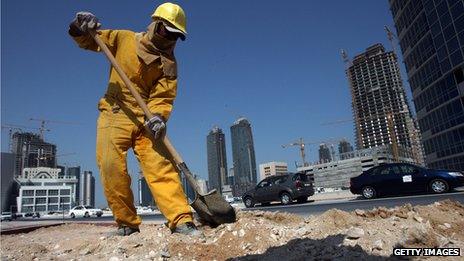Qatar's delicate balancing act
- Published

Qatar's rapid development has seen a massive influx of migrant workers who have few rights
Some people have all the luck. Take the Qataris. There are just 250,000 of them living in Qatar, the spit of land in the Gulf that sits on top of the world's third largest deposits of natural gas.
Qatar developed its economy later than the other Gulf states, who used to look down on the country as something of a poor cousin. It was only in the 1990s that Qatar began to exploit its North Field, the single largest gas field in the world.
Since then, the once-sleepy country has changed almost beyond recognition. Qatar now tops many of the measures used to assess a country's well being.
Take wealth for example.
In 2011, Qataris were the world's richest people in GDP per capita terms. This means that the economy produced $98,900 (£61,600) per person, more than twice as much as the US ($48,300) and over ten times the level seen in China ($8,400).
For Qatari citizens, the news is even better. GDP per citizen is in fact closer to $690,000. The $98,900 is an average for the total population which includes many migrant workers and Qatar's wealth is heavily concentrated among Qatari citizens.
Grumbles
Such an injection of riches has seen the country undergo a remarkable transformation. Qatar's economic boom, fuelled by surging gas exports, has drawn in workers who come from all over the world, but chiefly from South Asia.
They build the skyscrapers mushrooming all over Doha, polish the spotless hotel floors that are already clean enough to eat off, open doors that don't need opening for guests and provide, on average, one domestic servant for every two Qataris.
The population has tripled in the last decade alone, up from just over 600,000 people in 2001 to 1.9m in 2011. This rapid influx has left nationals as less than 15% of the total population.
In any other country this level of immigration would probably have led to serious levels of discontent. Some grumble that there are too many foreigners; others that there are too many Western influences. For older Qataris, the country is barely recognisable.
So, of course there are social strains, debates, and disagreements taking place within the small community of Qatari nationals - though these rarely come to an outsider's attention.
Yet in Qatar there is stability, or certainly more than is found in some of its neighbours.
Why?
Qatar's 'bachelor' workers
For one thing, the migrant majority does not get involved in politics. Migrant workers are short-term guests, liable to be deported if they start demanding more rights. Their political concerns are more likely to focus on events at home rather than Qatar. Unlike Bahrain or Oman, there is literally no indigenous working class.
Indeed, migrants lead almost entirely separate lives. Arrive at Doha airport on a late-night flight, and almost everyone in the arrivals hall is a blue collar, male worker from Asia. Qataris are more likely to use a separate terminal for premium-paying passengers.
Migrant workers make up a staggering 94% of the private-sector workforce. Nationals tend to work in the public sector. The few Qataris who do work in the private sector mainly work for banks or oil companies.
Migrants typically live in segregated areas, in accommodation provided by employers, and stay no more than five years. They cannot bring their families with them unless they earn over $1,922 a month.
Thus, the vast majority of workers come to Qatar as "bachelors", even though most of them have wives and children back home.
Many work in conditions that Human Rights Watch describe as "forced labour". They are often exploited by unscrupulous recruitment agencies whose exorbitant fees mean they start work with heavy burdens of high-interest debt, or by employers who withhold workers' passports and don't bother abiding by health and safety laws.
Generous state
Of course, life is different for the highly skilled expatriates, whether from the west or the east, who staff the banking and professional services sectors. Usually attracted by hefty salaries and low taxes, they tend to spend their evenings - and boozy weekend brunches - at Doha's various five-star hotels. In a telling sign of the difficulties balancing Western tastes with the sensitivities of a conservative local population, one such hotel bar features a sign outside: "No Qatari Females".
The influx of "bachelor" labourers has skewed the gender balance: women are now just one-quarter of the population. This too has created some anxieties; a few years ago, shopping malls started having dedicated "family days", where single men (and thus most labourers) are discouraged.
The second main reason for Qatar's political stability is that the country's nationals enjoy a range of generous state handouts, which have swelled under the rule of the current emir, Emir Hamad bin Khalifah Al Thani, who overthrew his father in 1995.
They are entitled to subsidies, state jobs, land grants, and free university education, the latter part of an effort to reinvest gas wealth in human capital, not just in shiny buildings. As one female graduate told me at a recent Doha Debate: "We have more rights than we deserve".
But this won't last for ever. Qatar's decision in 2011 to hike public sector pay by 60% - at a time when virtually all Arab governments granted pay rises, with one eye on the risk of protests - is a classic example of unsustainable policymaking designed for short-term effect.
The experience of Gulf countries that have been richer for longer indicates that expectations become inflated. What the first generation sees as generosity, their children see as a birthright.
So far, pressure for political change has been limited. Since at least 2004, the authorities have been promising their people a parliament. It hasn't happened yet, and most Qataris don't seem too bothered.
Poetic justice
But there is an increasingly glaring contrast between Qatar's support for revolutions abroad and Qataris' lack of representation at home.
Qatar's state-owned Arabic language TV channel, Al Jazeera, embraced most of the Arab uprisings with enthusiasm - except when protests came in neighbouring Bahrain, all too close to home. The state is helping the new governments of Egypt and Tunisia with aid and investment, and is one of the key backers of the Syrian opposition.
Yet within Qatar, power ultimately rests with just four key people; the emir, his wife, the prime minister and the Crown Prince. Understanding policymaking often involves second-guessing the wishes, intentions and rivalries within this small group of decision-makers.

Mohammed al-Ajami says he has not seen his wife or child for over a year
Most Qataris seem content with their leaders. But it is also risky for them to say otherwise - as has been shown by the recent case of Mohammed al-Ajami, a poet who has been sentenced to life in prison for a poem deemed "insulting" to the emir.
A small number of Islamists reportedly petitioned the emir for political reform in 2011, but did not make their demands public. More recently, an academic, Ali Al Kuwari, who has been holding small weekly meetings of reformist Qataris, has published a book arguing that Qatar needs transparency, freedom of speech, and a rethinking of its population policy .
And it is not just pressure internally that will weigh on the emir and his key advisers.
The poet's plight has attracted a lot of international attention. Qatar's hosting of the World Cup in 2022 will bring unprecedented international scrutiny. In the wake of critical reports from human rights groups, some promises of improvements in the rights of migrant workers have emerged. As in most Gulf countries, migrants are typically entirely dependent on a Qatari sponsor and have little legal protection.
The authorities have now said they'll allow trade unions, after sustained pressure from international workers' groups, though it may take a long time to make this a reality.
As Qatar continues its transformation at breakneck speed, it faces a tricky challenge balancing the religious sensitivities of a traditionally conservative community at home with efforts to liberalise the economy, to invest heavily in Western-style education, and with the need to cater to the burgeoning expatriate population.
How it responds will be watched closely - including by its Gulf neighbours, some of whom are none too pleased at its enthusiasm for regional revolutions.